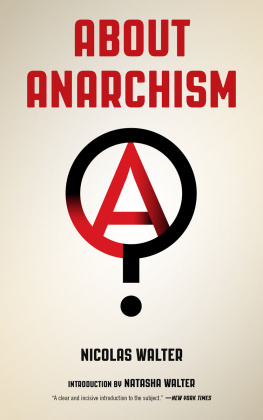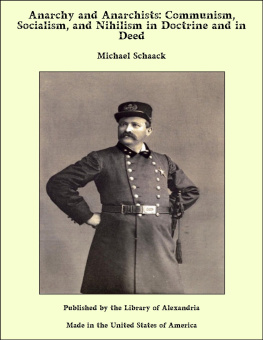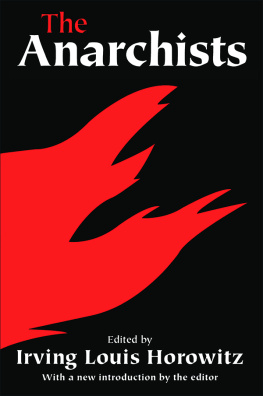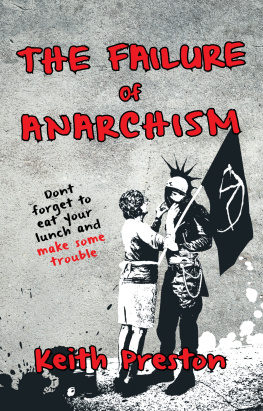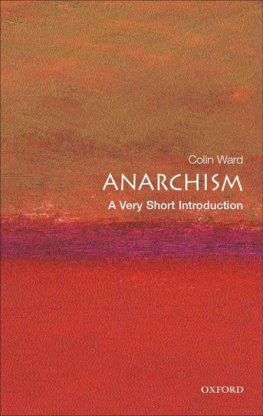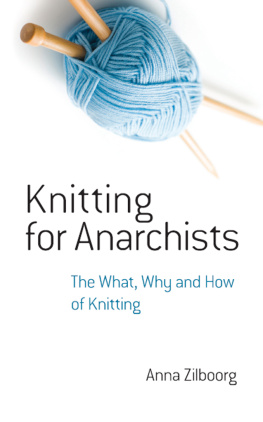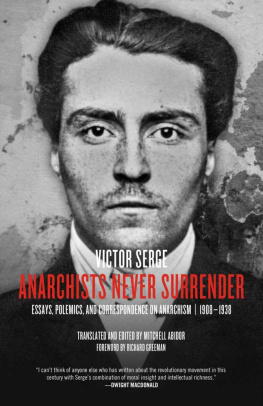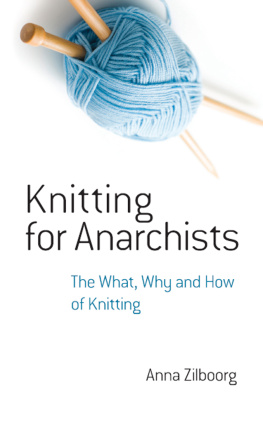Walter Natasha - About Anarchism
Here you can read online Walter Natasha - About Anarchism full text of the book (entire story) in english for free. Download pdf and epub, get meaning, cover and reviews about this ebook. City: Chicago, year: 2019, publisher: Independent Publishers Group;PM Press, genre: Politics. Description of the work, (preface) as well as reviews are available. Best literature library LitArk.com created for fans of good reading and offers a wide selection of genres:
Romance novel
Science fiction
Adventure
Detective
Science
History
Home and family
Prose
Art
Politics
Computer
Non-fiction
Religion
Business
Children
Humor
Choose a favorite category and find really read worthwhile books. Enjoy immersion in the world of imagination, feel the emotions of the characters or learn something new for yourself, make an fascinating discovery.
- Book:About Anarchism
- Author:
- Publisher:Independent Publishers Group;PM Press
- Genre:
- Year:2019
- City:Chicago
- Rating:3 / 5
- Favourites:Add to favourites
- Your mark:
- 60
- 1
- 2
- 3
- 4
- 5
About Anarchism: summary, description and annotation
We offer to read an annotation, description, summary or preface (depends on what the author of the book "About Anarchism" wrote himself). If you haven't found the necessary information about the book — write in the comments, we will try to find it.
About Anarchism — read online for free the complete book (whole text) full work
Below is the text of the book, divided by pages. System saving the place of the last page read, allows you to conveniently read the book "About Anarchism" online for free, without having to search again every time where you left off. Put a bookmark, and you can go to the page where you finished reading at any time.
Font size:
Interval:
Bookmark:
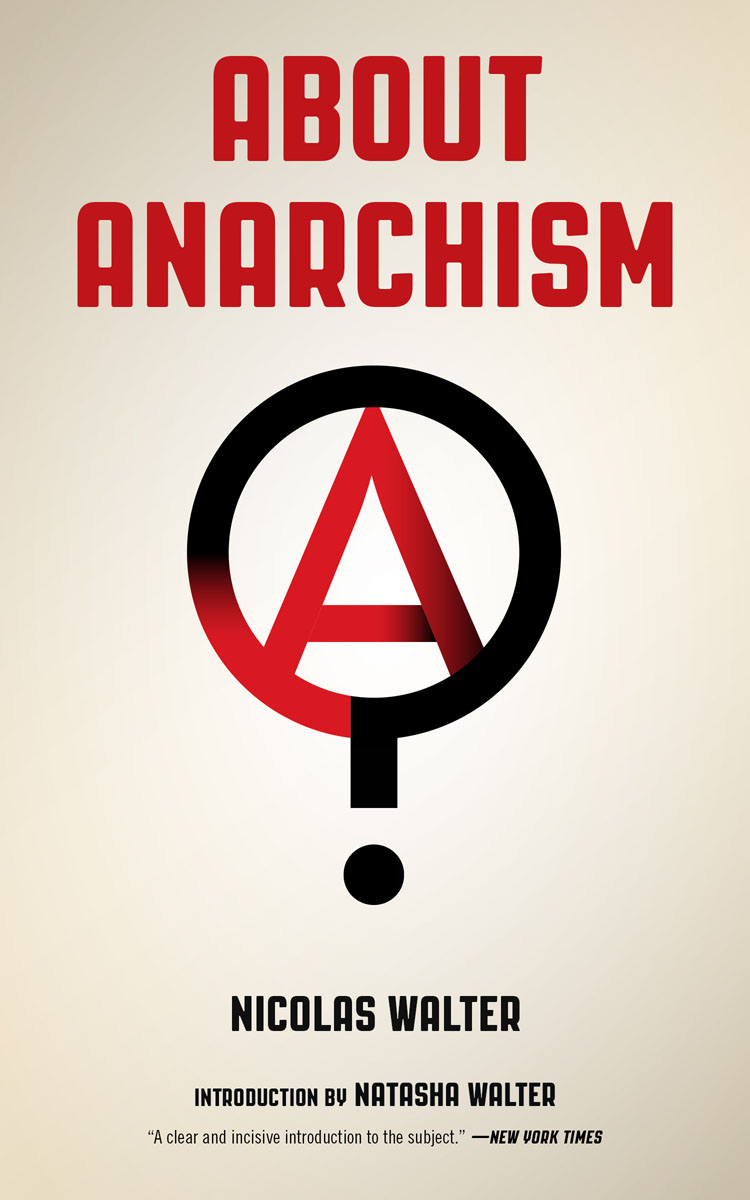
About Anarchism
Nicolas Walter
All contributions 2019 the respective authors
This edition 2019 PM Press
All rights reserved. No part of this book may be transmitted by any means without permission in writing from the publisher.
ISBN: 9781629636405
Library of Congress Control Number: 2018948959
Cover by John Yates / www.stealworks.com
Interior design by briandesign
10 9 8 7 6 5 4 3 2 1
PM Press
PO Box 23912
Oakland, CA 94623
www.pmpress.org
Printed in the USA.
 Contents
Contents Preface
PrefaceAbout Anarchism appeared originally in June 1969 as the hundredth number of Colin Wards celebrated Anarchy, a periodical to which Nicolas Walter was a frequent contributor. Freedom Press then immediately proceeded to bring it out as a booklet. The rest of its publication history is explained by Natasha Walter in her Introduction below. It was translated into many other languages, and it is said that its popularity led some anarchist parents to name their boys Nicolas. By the way, readers should note the correct spelling of Nicolas: it regularly appears with an erroneous h. When my daughter Emma told him one of her names is Nicola, he enquired after its spelling, responding instantly, Yes, thats the best way!
Something of the considerable influence About Anarchism exerted is revealed by Peter Marshall in his autobiography Bognor Boy: How I Became an Anarchist (2018). He believes that the key factors in his becoming an anarchist were the events of May 1968 in Paris, together with reading both Wildes The Soul of Man under Socialism and About Anarchism.
Nicolas wrote a mass of anarchist journalism, but About Anarchism was the most sustained (as well as successful) anarchist publication of his lifetime. The Anarchist Past and Damned Fools in Utopia are selections from his articles and pamphlets that I edited posthumously in 2007 and 2011 respectively.
About Anarchism continues to read freshly after fifty years. Its succinct, straightforwardly writteneven lucidcomprehensive and astonishingly non-sectarian. I warm particularly to the way in which, after distinguishing between philosophical anarchism, individualism and egoism, mutualism and federalism, collectivism and communism, and syndicalism, he observes that these differences have become less important, more apparent than real and artificial differences of emphasis, rather than serious differences of principle. I doubt this is true, whether in 1969 or 2019, but I wish that it were!

Nicolas Hardy Walter was born in 1934, in South London, where his father was researching at the Maudsley Hospital, and was rightly proud of his dissenting family background over several generations. His paternal grandfather, Karl Walter (18801965), a journalist, had as a young man been an anarchist, had known Peter Kropotkin and Edward Carpenter, and with Tom Keell was one of the two English delegates to the International Anarchist Congress at Amsterdam in 1907. Three years before he had married Margaret Hardy, an American woman he had met in Italy; and between 1908 and the First World War they lived in the States, where he worked on the Kansas City Star. In the 1930s, they settled in Italy, Karl Walter as a sympathizer of fascism; but in old age he returned to both anarchism and London, and in the last years of his life was writing occasionally for Freedom at the same time as his grandson. Nicolass father W. Grey Walter (19101977) was a brilliant neurologist who created ingenious electro-mechanical robots, wrote The Living Brain (1953)widely read in its Pelican editionwas Director for many years of the Burden Neurological Institute in Bristol and appeared on television in the BBCs The Brains Trust.
Nicolass maternal grandfather was S.K. (Samuel Kerkham) Ratcliffe (18681958), another journalist, who had also known Kropotkin and Carpenter (at whose funeral he was a mourner) and had served on the executive of the Fabian Society alongside Charlotte Wilson (whose anarchist essays his grandson was to edit). Although acting editor of the daily Statesman of Calcutta, 19031906, and editor of the Sociological Review, 19101917, he was essentially a freelance journalistand a rationalist liberal rather than a socialistbut he was also a formidable lecturer, undertaking no fewer than twenty-eight lecture tours of the USA and Canada. He served for forty years as an appointed lecturer of the South Place Ethical Society, the history of which he was to write, and Nicolas followed him in this role from 1978.
S.K.s brother William Ratcliffe became a painter and was a member of the Camden Town Group. Nicolass mother Monica had been one of Ninette de Valoiss dancers at Sadlers Wells. Grey Walter (who was three times married) and Monica Walter divorced when Nicolas was nine or ten, and he was brought up by his mother and her second husband, A.H.W. (Bill) Beck, who was to become Professor of Engineering at Cambridge.
Nicolas was sent to private schools in the Bristol area and then boarded at a minor and semi-progressive public school, Rendcomb College, Cirencester (to which E.D. Morel and John Middleton Murry had sent sons). On leaving school he did his two years National Service in the RAF as a Junior Technician in Signals Intelligence. He was one of those bright young men who were taught Russian as part of the Cold War effort; and it was on Russia, second only to British history and anarchism, that he was to write most extensively and percipientlyfor a considerable period he was contemplating a biography of Kropotkin.
In 1954, he went up to Exeter College, Oxford, to read Modern History. At Oxford he was a member of the Labour Clubhe had been brought up more or less as a Labour Party supporteran extreme left-wing Labour Party supporter1but in the autumn of 1956 the twin upheavals of the Suez Crisis and the Hungarian Revolution jolted him to question the accepted ideologies. On graduating in 1957, he left for London where he was to spend his entire working life, initially as a schoolteacheramong his first pupils was Christine Barnett, nine years his junior, who would later become his second wifebut soon moving on to political research, publishing and journalism. He participated in the political and cultural ferment of the first New Left, frequenting the Partisan Coffee House in Carlisle Street, and advocating nuclear disarmament before the actual formation of the Campaign for Nuclear Disarmament (CND) in 1958. Late in 1958, Karl Walter was responsible for introducing him to Lilian Wolfe, who had been Tom Keells companion and continued to live at Whiteway colony but during the week worked for Freedom Press, then in Red Lion Street. Nicolas began to visit the Freedom Bookshop and to attend the London Anarchist Groups weekly meetings. From 1959, he became a contributor to Freedom, an association only terminated by his death.
When in the autumn of 1960 dissatisfaction with CNDs legal methods and constitutional agitation spawned within it the direct-action Committee of 100, Nicolas had his first letter published in the Times defending the dissidents, and as a consequence was invited to become a member of the Committee to help round up the well-known names to the all-important figure of one hundred. As he was to write: I was never at all important in the Committee of 100, but it was very important to me.2 The Committee of 100 was the leading anarchistor at least near anarchistpolitical organization of modern Britain. The events of 19601962 led Nicolas to spend as much time as possible during the winter of 19611962, outside of work and his considerable political activity, in the Reading Room of the British Museum attempting with considerable success, to work out the historical lineage and above all the political theory of the Committee of 100, in Damned Fools in Utopia for the
Next pageFont size:
Interval:
Bookmark:
Similar books «About Anarchism»
Look at similar books to About Anarchism. We have selected literature similar in name and meaning in the hope of providing readers with more options to find new, interesting, not yet read works.
Discussion, reviews of the book About Anarchism and just readers' own opinions. Leave your comments, write what you think about the work, its meaning or the main characters. Specify what exactly you liked and what you didn't like, and why you think so.

